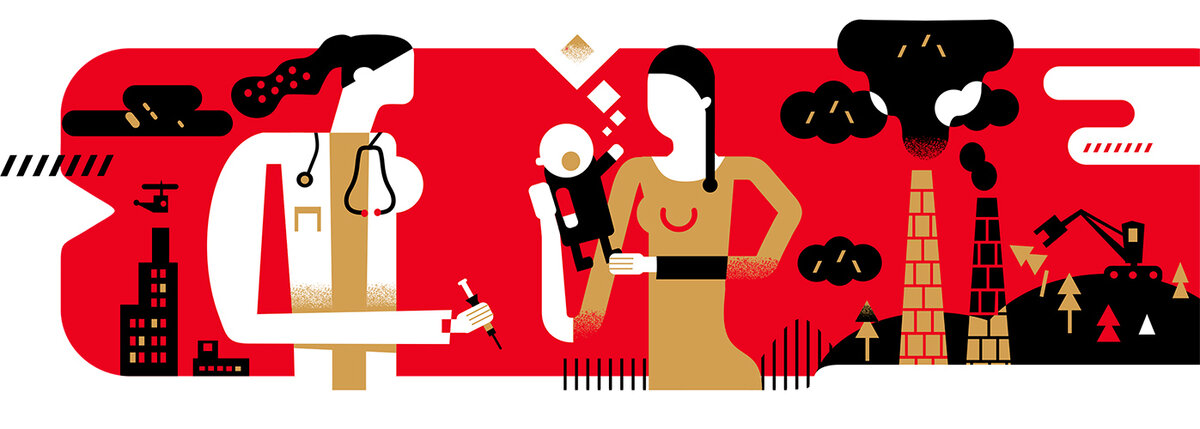- Exchange and Networking
- Knowledge and Learning
- Advocacy
- Our topics
The Network Medicus Mundi Switzerland is publishing this manifesto to help achieve the right to health for all within a generation, to ensure compliance with Agenda 2030 here in Switzerland and to strengthen the shared principles of Swiss organisations and institutions active in international health cooperation to support them in their commitment to this goal.

Illustration: Jamie Aspinall, Basel (© Medicus Mundi Schweiz)
The "Health for All Within a Generation" Manifesto has been jointly developed by the MMS member organisations
Preamble
The
Network Medicus Mundi Switzerland is publishing this manifesto to help
achieve the right to health for all within a generation, to ensure
compliance with Agenda 2030 here in Switzerland and to strengthen the
shared principles of Swiss organisations and institutions active in
international health cooperation to support them in their commitment to
this goal.
The manifesto is addressed to political
decision-makers in Switzerland in order to strengthen their resolve to
stand up for a Switzerland that has solidarity for those both within and
outside its borders – because a fair Switzerland is a prerequisite for
achieving health for all.
The manifesto is also intended for
colleagues in organisations and institutions engaged in international
health cooperation to encourage them to continue working together in a
committed and self-critical manner to achieve health for all.
What we advocate
Based on the comprehensive deliberations and analyses contained in the following section of this manifesto, we summarise:

Illustration: Jamie Aspinall, Basel (© Medicus Mundi Schweiz)
The Network Medicus Mundi Switzerland and its subscribing member organisations ascertain that the human right to health has not yet been implemented in Switzerland or the world: at least 400 million people worldwide have no or limited access to comprehensive healthcare; children are still being born into circumstances that deny them a healthy life; and far too many people live and work in conditions that make them sick and prevent them from growing old with dignity.
A high-quality primary health care as stipulated by the Alma-Ata Declaration of 1978 at the World Health Organisation’s International Conference on Primary Health Care is essential to achieving the right to health. Such a service aims to provide comprehensive healthcare that is determined by the needs of the population and in which participation by local communities plays a central role. It is a prerequisite to make health-related information, prevention and medical treatments accessible to people around the world as well as in Switzerland.
Health for all will not be achieved within the narrow framework of the health sector alone. Inequality and poverty are central factors that determine people’s health. The social, economic and environmental conditions into which people are born and in which they are raised and later work and grow old, determine health around the world. Rather than being a question of fate, inequality and poverty are the consequences of absent or incorrect political action and a lack of resources, of economic structures and the financial interests that lie behind them.
Considerable progress has been made in certain areas of health since the turn of the millennium. This has been achieved in part thanks to large investments by the international community. We realise, however, that this progress has not reached all population groups across the world in equal measure.
Such advances in health cannot be taken for granted. They are particularly threatened if we fail to defend healthcare as a public good and instead privatise it as a commercial commodity. And they are also threatened if we continue to allow the natural resources of our planet to be destroyed.
Around the world, people’s health and the healthcare provision of today and the near future are being shaped by the following trends, which can either strengthen or weaken the right to health: globalisation, demographic change and migration, wars, conflicts and climate change, global proliferation of non-communicable diseases with the concomitant continuation of communicable diseases, an increase in antimicrobial resistance (AMR). We can only respond to these trends if cooperation is strengthened at all levels – locally, nationally and globally.
As representatives of Swiss civil society, and as citizens of this country, we are proud of the well-established principle of solidarity and humanitarian tradition in Switzerland. We are committed to these attitudes and values, in the knowledge that only a Switzerland that espouses solidarity can fulfil its global responsibilities.
We are not alone in our commitment to health for all – the Agenda 2030 for sustainable development has set a collective global framework of objectives which we recognise and support. We emphasise that, in accordance with Agenda 2030, health welfare can only be achieved if it is addressed beyond the narrow limits of the health sector, by combating poverty and adhering to the Agenda 2030 principle of leaving no one behind.

Illustration: Jamie Aspinall, Basel (© Medicus Mundi Schweiz)
The provision of quality basic healthcare is one of the requirements for attaining the right to health. For such a provision to work to the benefit of the people, various preconditions must be met. Primarily, access to healthcare services must be ensured. And that means for everyone – regardless of gender or sexual orientation, background or ethnicity, age, physical and psychological capacities or socioeconomic status. From our experiences in Switzerland we know how difficult it is to ensure this even in an environment with sufficient financial resources.
In low and middle-income countries, our local partners face a variety of challenges at all levels that make it difficult or even impossible to access healthcare services.
> Inadequate infrastructure and poor healthcare provision prevent access:
Health
centres are difficult to reach in rural areas, medicines are too
expensive or locally unavailable and the population is denied access to
health-related information or must pay for healthcare themselves,
driving many people and their families into poverty.
> A lack of trained healthcare workers prevents good healthcare:
Existing
healthcare workers work in inadequate conditions and are often badly
paid. This frequently leads doctors, nurses and midwives to quit public
health in favour of private healthcare facilities, or to leave remote
communities for urban centres. They also tend to move from countries
with weak healthcare systems to rich countries who are failing to train
sufficient numbers of healthcare workers themselves.
> Misunderstanding of what basic healthcare is undermines its acceptance:
Basic
healthcare means the provision of a comprehensive, high-quality primary
healthcare service that should be the foundation of every healthcare
system. The service must be accessible to all, meet people’s needs and
be culturally and socially acceptable. In contrast, poor quality basic
healthcare provision undermines the public acceptance that is essential
for any healthcare system to function.
> Inequality and discrimination undermine health goals:
Inequality
– worldwide and within a country – is the key health determinant.
Socioeconomic factors often go hand in hand with discrimination of
various kinds. They make people ill and severely impede access to
healthcare.
> Lack of democratic legitimacy for healthcare:
Primary
health care necessitates the participation of the population – they
determine which health requirements should be addressed and how. The
service providers are accountable to the population. This can only be
possible in a democratically legitimised arena and with a corresponding
political culture.
> New developments in health increase pressure on already weak healthcare systems:
Globalisation
and the concomitant proliferation of unhealthy products are increasing
the incidence in low and middle-income countries of non-communicable
diseases such as cardio-vascular illnesses, diabetes and cancer. These
diseases place the population at an increased risk of poverty and add
additional pressure to already weak healthcare systems.
> Political instability, a lack of rule of law and armed conflicts undermine efforts to strengthen healthcare:
Effective
healthcare systems depend on a stable environment that guarantees the
rule of law and peace. For this reason, strengthening primary health
care in fragile contexts presents a major challenge.
> Insufficient funding for healthcare:
Every
government bears the responsibility to ensure the right to health for
the entire population in its territory. At the same time, financial
resources within healthcare systems are often unevenly spent in favour
of hospital care, which is always to the detriment of primary health
care provision. Ultimately, many countries lack the financial means to
furnish their healthcare systems with sufficient resources.
Mismanagement, corruption and unjust taxation systems lead to the loss
of financial resources which are then lacking in the health and welfare
systems. Last but not least, the financial and taxation policies of rich
countries – including Switzerland – prevent low-income countries from
mobilising the financial resources that exist within their countries.
All the issues and challenges presented above are barriers to achieving health for all – but they are not insurmountable barriers. If all parties – the international community with its institutions, governments, business, civil society and populations – take their responsibilities within Agenda 2030 seriously, the right to health can be realised.

Illustration: Jamie Aspinall, Basel (© Medicus Mundi Schweiz)
As representatives of Swiss organisations and institutions that have successfully worked – in some cases for decades – for the health of disadvantaged populations, we know that we must constantly evolve to fulfil our responsibilities.
In this context, we declare the following:
1. Place disadvantaged populations at the centre
Health cooperation focuses on asserting the right to health for the populations where our organisations operate. We will always do this in cooperation with the populations themselves and their civil society structures. While developing our programmes and projects, we will preference the cooperation of the population over purely institutionally driven logic. We are accountable first and foremost to the populations for whom we are working.
2. Strengthen healthcare systems through cooperation
Whenever possible, we will collaborate with state actors to tailor projects and programmes to dovetail with and strengthen their national healthcare systems, rather than weakening them further.
Our on-the-ground personnel policy will not interfere with the local job market, for example, by inducing healthcare workers to leave public healthcare provision and join our programmes. We will instead strengthen local capacity and invest in local healthcare workers.
3. As learning organisations, to constantly review and adjust our roles
The consistent implementation of Agenda 2030 will lead to a continuing evolution in the role of Swiss organisations involved in international cooperation. The number of projects and programmes we implement ourselves will continuously decrease; local partners will increasingly take on this task; our role will become more and more that of facilitator, imparting knowledge and procuring still-lacking resources. Collaboration and partnerships will become ever more important.
We regard ourselves as learning organisations. Thus, our network is committed to developing the existing knowledge of our member organisations and to creating new knowledge. That is why we are working towards placing our projects and programmes on a more scientific footing by strengthening our scientific competence and entering into partnerships with research institutions.
4. It is not a matter of aid, it is a matter of justice
As organisations active in public health, we know that, above and beyond individual aspects, it is the social, economic and environmental factors that determine whether or not someone falls ill. It is undisputed that the degree of inequality determines the state of a population’s health. Against this backdrop, we are aware that our own work can contribute to the perpetuation of injustice. Nevertheless, we cannot, and will not, leave anyone alone in misery without help.
However, we also realise that, in association with our partners here in Switzerland and around the world, we need to tackle and change the conditions that make people ill. We can and will strengthen our work further in this regard, learn from our partners and empower the local populations with which we work to fight for their rights and against discrimination within their own communities.
Because this is a matter of justice, we are committed to advocating a political and economic approach that puts human rights first, protects people’s health and secures the necessary financial resources for sustainable development worldwide.
5. Maintain support in Switzerland
International health cooperation by Swiss organisations is, thanks to their diverse nature, well-established across the many different population groups in Switzerland. But this fundamental solidarity that exists in wide sections of society is endangered by persistent attacks on human rights, on the cosmopolitan nature of Switzerland and on international cooperation.
It is therefore our responsibility to advocate for this solidarity within society, in a self-aware and self-critical way. To this end, we will inform our donors, financial partners and the broader public about our work and its limitations. But we must also stop, especially in our advertising, from cementing stereotypical images of poverty-stricken populations. Instead, we want to communicate the inspirational solutions that are frequently being developed by our partner organisations and local populations.
6. The right to health applies worldwide – including in Switzerland
The right to health means creating conditions for everyone in the world in which children are born and grow up healthily and everyone can participate in society. These conditions should enable all adults to engage in work that will not make them ill and to grow old with dignity. We want a world and a Switzerland in which all people have equal access to healthcare according to their needs which is comprehensive, affordable, good-quality and locally accepted, without leaving anyone behind.
The Network Medicus Mundi Switzerland and its member organisations continue to be committed to the human right to health around the world. This right is by no means a given even in Switzerland: those affected or threatened by poverty have difficulties paying their health insurance premiums; undocumented people and migrants lack access to healthcare services; healthcare provision fails to meet the specific needs of people with disabilities. We can only credibly insist upon the right to health if we speak out when that right is violated here in Switzerland. Because the right to health is indivisible.
7. For a Switzerland that demonstrates solidarity and is consistently committed to the right to health
We will continue to work to ensure that Switzerland at long last takes on its responsibility for the right to health around the world in a coherent and consistent way. As a global player, the Swiss economy influences global health in various ways. The Swiss government therefore has a special responsibility to commit in its foreign and economic policies to the right to health, without putting a unilateral focus on the interests of the economy.
We expect the Swiss government to commit unequivocally to the implementation of Agenda 2030 and to invest the required funds of at least 0.7 percent of the country’s gross domestic product in international cooperation – as the UN expects its member states to do.
We understand that such a policy of solidarity should not be restricted to international health cooperation. It should be seen in the context of an open Switzerland which assumes its international responsibility and, rather than isolating itself, is committed to human rights and sustainable development following the principles of the Agenda 2030 both at home and abroad. Because health for all by 2030 is a realistic goal that we are working towards together in Switzerland and around the world.
MMS/November 2018